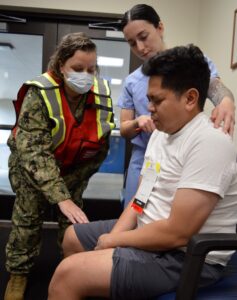
Story by Douglas Stutz
Naval Hospital Bremerton/Navy Medicine Readiness and Training Command Bremerton
The announcement came suddenly.
Just as abruptly came the reaction.
Navy Medicine Readiness Training Unit Bangor staff rapidly responded to a [mock] earthquake, Oct. 17, 2024.
The exercise scenario – held in conjunction with Commander Naval Installations Command Citadel Rumble and Operation Dynamo 2024 – provided the opportunity for the branch health clinic to test a handful of objectives which are considered crucial during any actual seismic event.
According to Hospital Corpsman 2nd Class Jesse Hamby, radiology technologist assigned to the clinic, the clinic’s major goals to accomplish during the exercise were met.
“Our objectives were to drop, cover and hold; evacuated everyone, have 100 percent accountability; triage all patients appropriately, and communicate with each other throughout the drill,” explained Hamby.
With the clinic located on Naval Base Kitsap Bangor, the medical and dental staff provide direct healthcare to the Sailors and Marines stationed on the sprawling compound, a sizable part of the third largest fleet concentration in the U.S. The base is also nestled – as is the rest of the greater Puget Sound region – in a locale with a number of active fault zones with routine seismic activity. There have been over 70 minor earthquakes over the last several weeks.
“This is the first time we’ve done this in a number of years. But it is something we need to do in case it does happen. Overall, we did really well. Actually, better than expected,” said Senior Chief Hospital Corpsman Randy Fugere, NMRTU Bangor leading chief petty officer, adding that communication effort amongst staff all during the exercise was prompt, as was handling the flow of those injured needing medical care. “Communication, sharing information, is always huge and important during an event like this.”
The 2001 Nisqually earthquake – with an epicenter approximately 55 miles south of NMRTU Bangor parent command, Naval Hospital Bremerton – measured a strong 6.8 magnitude and shook the entire Puget Sound region as the Juan de Fuca Plate shifted deeper into the earth. That upheaval invoked NHB to become the first Navy Medicine military treatment facility to become seismic retrofitted in 2007 to withstand future sizable earthquakes.
Annual exercises such as Citadel Rumble and Operation Dynamo 2024 are held to prepare personnel to effectively respond when another sizable quake does take place, because seismologists have long contended it’s just a matter of if, not when.
NMRTU Bangor is ready.